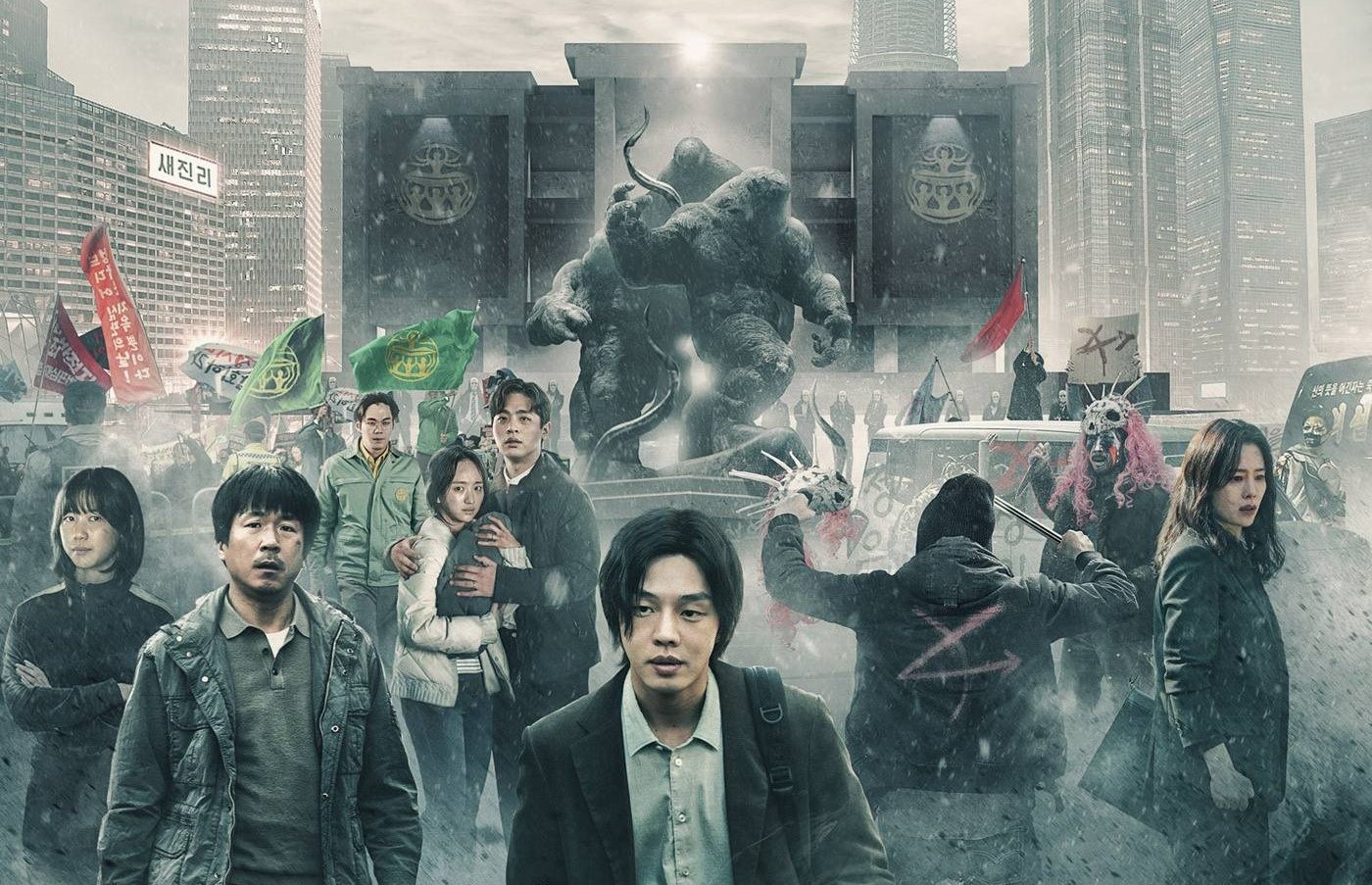They are entirely worst-case scenarios—bleak and frightening—but they are also rife with enigma, which often leaves us agog

The Korean dystopian drama’s creative vision of a dystopian world replete with tensions and apprehensions raises all the red flags of a looming cataclysm. In frame: poster for 'Hellbound.' Photo: Netflix, courtesy of HanCinema
Conversely to an ideal utopian society devoid of criminality and brute force, the dystopian ethos is fraught with dread, authoritarianism, or other traits symptomatic of an impending doom within the social fabric. While dystopia and dystopian fiction are entirely worst-case scenarios—bleak and frightening—they are also rife with enigma, which often leaves us agog. Dystopia comes across as a nightmarish, dark future where phobias are deeply ingrained. Korean dystopian narratives, in that sense, provide us with a vivid glimpse of a comparable condition and occasionally may also hint at a dog-eat-dog Korean culture.
As in the 2092 scenario of Space Sweepers (2021), dystopia in science fiction mostly stresses the serious repercussions of how things stand. In the space blockbuster, the UTS firm creates an alien civilization where Kim Tae-ho (Song Joong-ki), Captain Jang (Kim Tae-ri), Tiger Park (Jin Seon-kyu), and a robot dubbed Bubs, dwell as space sweepers after Earth becomes unfit for life. Digging through debris, they uncover Victory, a wrecked spaceship with a young girl inside (sought by the “UTS Space Guards”), and plan to demand a ransom in exchange for her.
Space Sweepers directed by Jo Sung-hee was Korea’s first shot at a space-based movie and is resplendent in its space spectacle; it is also blatantly dystopian, notably with regards to the siege of Mars, likened to the affluent putting together Armageddon.
The Korean dystopian drama’s creative vision of a dystopian world replete with tensions and apprehensions raises all the red flags of a looming cataclysm and its repercussions. The widely acknowledged Hellbound (2021) can be accredited as an ideal case in point. Its events unfold between 2022 and 2027, when South Korea becomes ground zero, where, by issuing decrees that condemn some to hell at a given time, an unearthly visage abruptly begins to manifest. In a sublime demonstration, three colossal apparitions emerge at the designated time to chastise the targets, ripping and searing them in the process. Conspiratorial groups—the gang-like Arrowhead group and the cult-like New Truth Society—begin to capitalize on public dread at this juncture.
The intricate plot analysis and characterization of how human morality disintegrates amid a catastrophe serve as a stand-in for a parallel that may hit hard, possibly harder, notwithstanding the monsters and their harrowing monstrosities that appear less reasonable. It is the lionized Yeon Sang-ho’s painstakingly produced spook, too graphic and savage, with images that are abominable, unnerving, and at the same time leave you contemplating; zapped even thanks to its top-notch production—its mind-bending VFX.
Director Yeon’s subsequent sci-fi Jung_E (2023) is also an effective dystopian realm that artfully integrates artificial intelligence in fiction, intense action, and an ironic critique of greed while maintaining a poignant mother-daughter chronicle at its heart. In 1872, Samuel Butler shed light on artificial intelligence in his Erewhon. Since then, a slew of robot uprising stories have examined the implications of such intelligence. The most prominent is Stanley Kubrick’s 1968 film 2001: A Space Odyssey, starring the lethal HAL 9000 as opposed to R2-D2 from 1977’s Star Wars and the titular robot from 2008’s WALL·E.
This time, an analogous Jung_E follows a researcher at an AI lab attempting to make a robot by cloning the brain of her mother, the legendary mercenary Jung E. On a dead, desolate Earth spurred by climate change, events transpire in the 22nd century. In the throes of chaos, when a war breaks out within the bunker built for human survival, its outcome depends on whether it is possible to design an automated robot equivalent to Jung E.
Pollution wreaking havoc on the ecosystem is a recurring theme in dystopia, as in one of the more successful contemporary Korean dystopian titles, Black Knight (2023), helmed by Cho Ui-seok and centered on Lee Yoon-gyun’s webtoon Delivery Knight. It is 2071 in Black Knight, and being without a respirator isn’t easy in a dire, air-polluted Korea. Delivery men are vital for the minority of locals to remain alive. One day, Sa-wol (Kang Yoo-seok), a refugee dreaming of being a delivery driver, stumbles upon 5-8 (Kim Woo-bin), a famed delivery man with incredible fighting skills. The two and a few more join forces later against the Cheonmyeong Group, an enormous power structure that currently holds sway over all of humanity.
The portrayal’s highlight is how relatable its post-apocalyptic setting for nihilism and horror is. As we are drawn further and further into an epidemic-ridden, eerie society, the black knights emerge as heroes despite the noxious landscape, and our impression of their heroism is only reinforced when we see them—they are the frontline workers standing tall, conjuring a fantastic metaphor for life within a dying civilization.
The composer-producer brings in the vocal artistry of Sid Sriram, Divyam Sodhi, Amira Gill, Pratika…
The drama will star So Ji-sub as an ex-gangster who returns to the crime world…
Tamil reggae and hip-hop artist will release ‘My Perfect Yard’ via Sony Music Malaysia in…
Featuring artists Rachana Kaura, Pragati Nagpal and more
The desi diaspora artist’s collaboration sways between hip-hop, pop and electronic, with producers Satori Stereo…
Abel Tesfaye's very long sixth album tackles some very real stuff